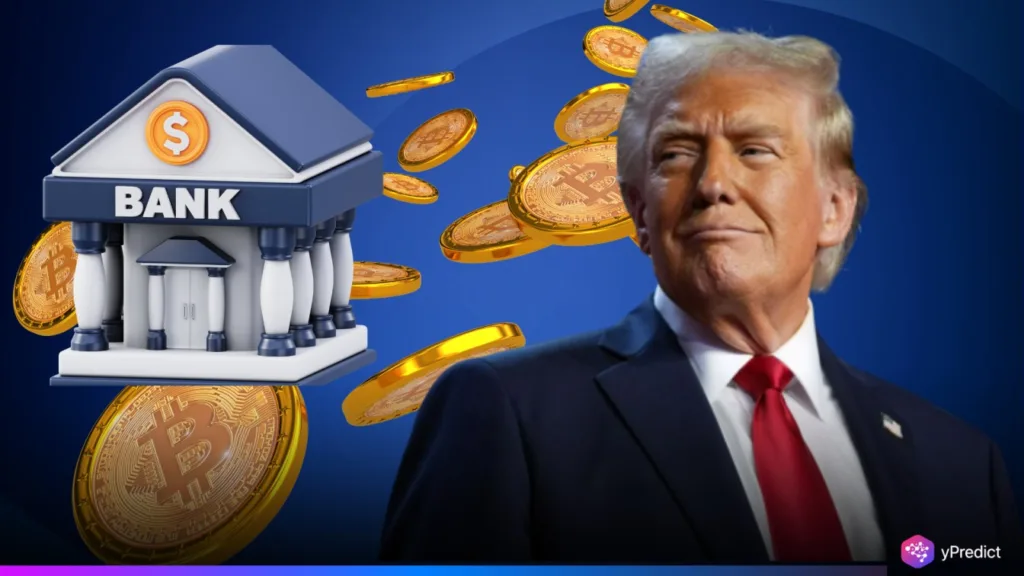
A Wall Street Journal report reveals that former President Donald Trump is preparing to sign an executive order aimed at penalizing banks that “debank” cryptocurrency companies. This anticipated Trump Crypto directive seeks to curb the ongoing trend where traditional banks shut down accounts of digital asset firms, citing regulatory risks. The order aligns with Trump’s broader crypto agenda and the January 2025 White House initiative to reinforce U.S. dominance in blockchain integration and AI-driven digital asset strategy. The move signals a deepening commitment to the future of finance—where artificial intelligence and decentralized technologies converge.
Executive Order to Halt Crypto Debanking
The Trump Crypto order comes in response to a rising backlash against banks denying services to legal crypto businesses. The practice, commonly referred to as “debanking,” has been a growing concern in both the U.S. and abroad. A 2021 case in Australia, where a Bitcoin trader sued major banks for account closures, helped spotlight the issue globally. Trump’s executive order reportedly aims to hold financial institutions accountable if they discriminate against digital asset firms without clear justification.
Supporters argue this move is necessary to counteract an unspoken crackdown on innovation, especially when many debanked businesses comply fully with AML and KYC standards. Trump’s action may force regulatory bodies and banks to reevaluate blanket policies that stifle legal operations based purely on risk perception rather than violation.
AI and Crypto Merge Under U.S. Leadership Strategy
The Trump Crypto push builds on a broader national strategy unveiled in January 2025. That White House order established a Working Group on AI and Crypto, tasked with strengthening the U.S. position in global digital asset leadership. The group’s mandate involves bringing artificial intelligence into the regulation, deployment, and audit of blockchain systems/indexes.
Through AI and blockchain integration, the administration is aiming to build a smarter framework for compliance, predictive oversight of finances, and fraud detection in real time. The executive order against debanking becomes a foundational piece in this larger puzzle—creating a digital economy where AI tools govern decentralized financial ecosystems with precision.
Banks Face Heat Amid Lack of Peer Consensus
The issue of crypto debanking remains hotly contested. Monetary institutions contend that they are merely following compliance obligations of FinCEN and federal regulators to help eliminate risks from money laundering and illicit finance. Critics such as venture capitalist Marc Andreessen, who raised the issue in late 2024, assert that banks weaponize these obligations to avoid competition and innovation.
There is no peer-reviewed consensus on how to strike a balance between risk mitigation and access to finance involving digital assets, but the Trump Crypto order seems to favor access, especially if under AI supervision. Rather than treat all crypto entities as inherently risky, regulatory agencies and banks can leverage the technological innovation of AI to maximize their knowledge of risk associated with firms, while also identifying “good actors” in real-time.
Shifting U.S. Policy Signals Blockchain Embrace
Trump’s expected executive order marks a strategic pivot in U.S. digital asset policy. It not only responds to domestic outcry but also positions the country as a proactive leader in crypto regulation. The move aligns with global efforts to incorporate AI into financial systems and furthers the idea that blockchain integration isn’t a fringe concept—but a core part of modern infrastructure. The strategy has the potential to facilitate the use of AI tools by banks in compliance initiatives by requiring banks to explain their debanking decisions.
Ultimately, the Trump Crypto agenda supports an ecosystem of dollars, digital assets, machine learning, and blockchain to operate transparently and securely. The focus on limiting unjustified debanking activity could alter the relationship between banks and crypto firms by legitimizing compliant entities and facilitating the widespread use of AI tools. With the Working Group on AI and Crypto already in motion, the order sends a clear message: blockchain and digital assets will be essential pillars in the nation’s evolving financial strategy.






